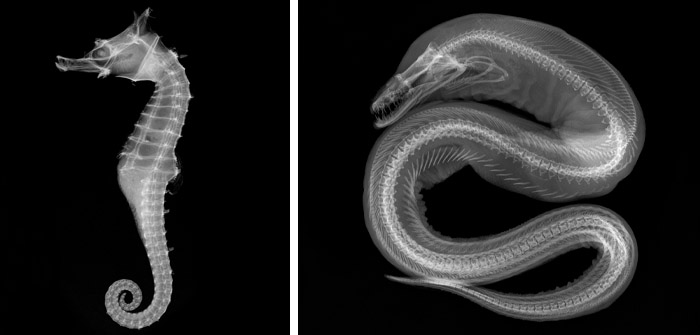((L) Hippocampus Sindonis (R) Enchelynassa Canina | Photos courtesy of High Desert Museum)
When many of us think of X-rays, we think of peering beneath the skin to detect an illness or injury. Imagine using the technology to see into vertebrates with the goal of learning evolutionary stories.
That is precisely what the Smithsonian’s National Collection of Fishes has accomplished with their largest and most diverse collection of fish X-rays in the world. While the X-rays featured in the national collection were made for research purposes, the striking images demonstrate the natural union of science and art.
Now, these ethereal images are coming to the High Desert Museum in X-Ray Vision: Fish Inside Out, an exhibition from the Smithsonian’s National Museum of Natural History and Smithsonian Institution Traveling Exhibition Service (SITES). The exhibit opens on Saturday, September 18.
The exhibition features approximately 40 black-and-white digital prints of different fish species. Arranged in evolutionary sequence, these X-rays give a tour through the long stream of fish evolution. Species featured in the exhibit include the rainbow trout (Oncohynchus mykiss), native to the High Desert, and others such as Shiho’s seahorse (Hippocampus sindonis) and the rarely seen pelican eel (Eurypharynx pelecanoides).
“Our partnership with the Smithsonian brings unique experiences to our visitors,” said Museum Executive Director Dana Whitelaw, Ph.D. “We can’t wait to explore this one-of-a-kind collection that shares the intersection of science and art and tells the tale of fish evolution.”
The exhibition curators work in the Division of Fishes at the National Museum of Natural History and have collected thousands of X-rays of fish specimens to help ichthyologists understand and document fish diversity. The X-rays have allowed Smithsonian and other scientists to study the skeleton of a fish without altering the specimen, making it easier for scientists to build a comprehensive picture of fish diversity.
X-Ray Vision: Fish Inside Out (highdesertmuseum.org/x-ray-vision) will be on display through May 8, 2022.
It is organized by the Smithsonian’s National Museum of Natural History and SITES. It was inspired by the book Ichthyo: The Architecture of Fish (Chronicle Books in association with the Smithsonian Institution, 2008) by Stephanie Comer and Deborah Klochko.
The exhibit is made possible locally by Bend Pet Express, Central Oregon Daily News, 100.1 FM KBND and Lonza Pharma and Biotech with support locally from 104.1 The Peak, 1859 Oregon’s Magazine and the James F. and Marion L. Miller Foundation.
The Smithsonian’s National Museum of Natural History, located at 10th Street and Constitution Avenue N.W. in Washington, D.C., welcomes more than 6 million visitors annually. The museum is open daily. Admission is free. For further information, call (202) 633-1000, TTY 202-633-5285 or visit the museum’s website at mnh.si.edu.
SITES has been sharing the wealth of Smithsonian collections and research programs with millions of people outside Washington, D.C., for over 70 years. SITES connects Americans to their shared cultural heritage through a wide range of exhibitions about art, science and history, which are shown wherever people live, work and play. Exhibition descriptions and tour schedules are available at sites.si.edu.

